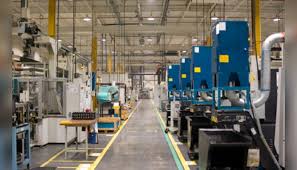Nigeria needs to urgently reposition its manufacturing sector if it hopes to compete favourably in global trade and strengthen its non-oil economy. Recent data shows that manufacturing contributed only 9.62 per cent to Nigeria’s Gross Domestic Product, a figure far below the performance of the world’s top industrial nations. China, for instance, records manufacturing as contributing nearly 30 per cent of its GDP, while South Africa, the best performer in Africa, stands at about 13 per cent. Analysts believe Nigeria has a wide opportunity to improve and reclaim its past glory in manufacturing.
Industry watchers recall that Nigeria once performed strongly in manufacturing before the sector began to decline. They argue that the country can still return to its former position by focusing on processing raw materials locally instead of exporting them in their raw form. According to experts, the nation is shortchanging itself by exporting unprocessed raw materials when it could be creating jobs, boosting exports, and earning foreign exchange through value addition.
Manufacturing is widely regarded as one of the best job creators. Once Nigeria begins to process raw materials at scale, industries will emerge across sectors, providing employment opportunities for millions of citizens. Observers point to the Dangote Refinery as an example of what is possible when local processing is prioritised. The refinery has reduced Nigeria’s heavy dependence on imported petroleum products and saved the country millions of dollars in foreign exchange.
Analysts maintain that Nigeria cannot skip manufacturing in its journey toward economic transformation. “We cannot leapfrog manufacturing at this stage of our growth,” one expert noted. “Everything around us, from shoes and socks to phones and books, are made abroad. That is not right. A country should produce most of the basic things it consumes.”
Stakeholders say Nigeria has the capacity to compete globally, with many local companies already producing quality goods at affordable prices. However, some manufacturers operate discreetly, avoiding publicity for fear of harassment from multiple tax agencies and regulators. Many continue to run their businesses without signboards, focusing only on survival.
On the international stage, Nigeria’s championing of the African Continental Free Trade Area (AfCFTA) is seen as a crucial step. The trade agreement creates a single African market, making it easier for goods and raw materials to move across the continent. Experts believe that by leveraging AfCFTA, African nations can achieve the scale of production enjoyed by countries such as China and India. Nigeria’s early adoption of AfCFTA laws is viewed as a strong signal of its intent to benefit from the initiative.
Nigeria’s recent move to join BRICS is also being closely watched. Although tariffs imposed by the United States are expected to hurt in the short term, analysts suggest they could push Nigeria and other African countries to trade more among themselves and maximise the opportunities presented by AfCFTA.
Despite these opportunities, Nigeria’s exporters face numerous obstacles. Exporters and manufacturers encounter delays at the ports due to bureaucracy and poor infrastructure. Bad roads linking production hubs to seaports further complicate logistics and increase costs. Observers say that the resilience of Nigerian entrepreneurs, who continue to push despite these barriers, remains one of the country’s greatest strengths.
Data shows that manufactured goods exports grew year-on-year by 9.58 per cent in the first quarter of 2025, reflecting the resilience of the sector. However, to sustain this growth, Nigeria needs entrepreneurs, financing, leadership, and skills development. Many manufacturers complain about limited access to affordable loans, with banks charging high interest rates despite government-backed schemes meant to provide single-digit financing.
Experts also highlight the importance of leadership at both government and private sector levels. They argue that government must make manufacturing a national priority, just as countries like China and India did. At the same time, associations such as the Manufacturers Association of Nigeria (MAN) and chambers of commerce need to facilitate industry-wide dialogue and technical knowledge-sharing sessions to encourage innovation.
Skills development is another area requiring urgent attention. Nigeria lacks sufficient skilled workers for its manufacturing sector, and the educational system has not been tailored to meet industry needs. Observers argue that the country has focused too much on university education while neglecting vocational training. They say many graduates end up taking vocational training after school, skills they could have acquired earlier.
Vocational education, according to experts, is central to Nigeria’s industrial growth. In the 1960s and 1970s, technical schools played a strong role in preparing skilled workers, but that legacy has since declined. Reviving vocational and technical schools is seen as vital to creating the workforce needed for industrialisation.
With a young and entrepreneurial population, Nigeria is well-placed to revive its manufacturing base. By providing financing, reducing bureaucracy, strengthening infrastructure, and investing in vocational education, the country can increase the share of manufacturing in its GDP and scale its non-oil exports far beyond the current 15.38 per cent.
